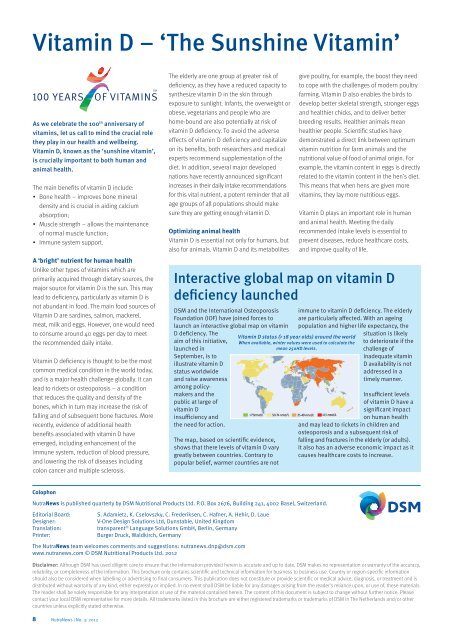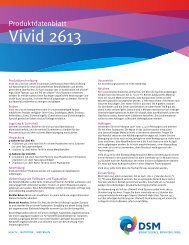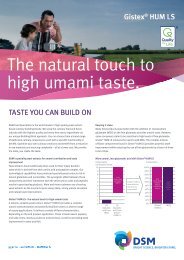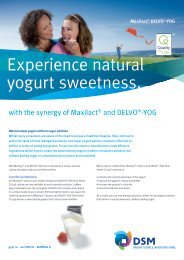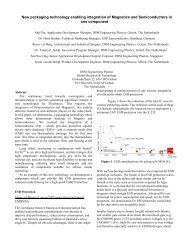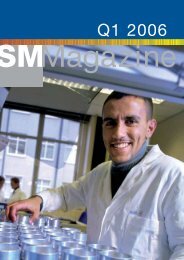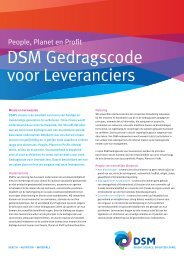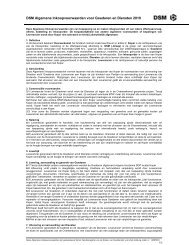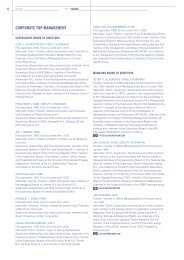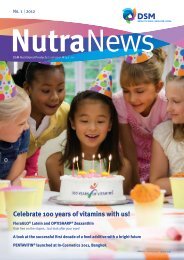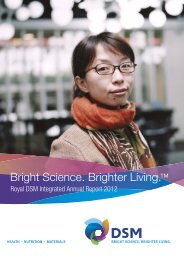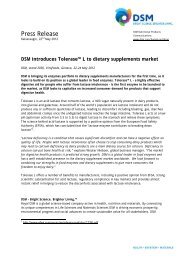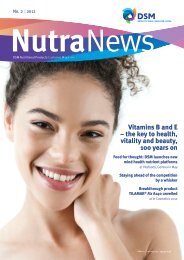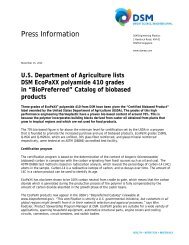NutraNews - DSM Nutritional Products newsletter 3/2012
NutraNews - DSM Nutritional Products newsletter 3/2012
NutraNews - DSM Nutritional Products newsletter 3/2012
Create successful ePaper yourself
Turn your PDF publications into a flip-book with our unique Google optimized e-Paper software.
Vitamin D – ‘The Sunshine Vitamin’<br />
As we celebrate the 100 th anniversary of<br />
vitamins, let us call to mind the crucial role<br />
they play in our health and wellbeing.<br />
Vitamin D, known as the ‘sunshine vitamin’,<br />
is crucially important to both human and<br />
animal health.<br />
The main benefits of vitamin D include:<br />
• Bone health – improves bone mineral<br />
density and is crucial in aiding calcium<br />
absorption;<br />
• Muscle strength – allows the maintenance<br />
of normal muscle function;<br />
• Immune system support.<br />
A ‘bright’ nutrient for human health<br />
Unlike other types of vitamins which are<br />
primarily acquired through dietary sources, the<br />
major source for vitamin D is the sun. This may<br />
lead to deficiency, particularly as vitamin D is<br />
not abundant in food. The main food sources of<br />
Vitamin D are sardines, salmon, mackerel,<br />
meat, milk and eggs. However, one would need<br />
to consume around 40 eggs per day to meet<br />
the recommended daily intake.<br />
Vitamin D deficiency is thought to be the most<br />
common medical condition in the world today,<br />
and is a major health challenge globally. It can<br />
lead to rickets or osteoporosis – a condition<br />
that reduces the quality and density of the<br />
bones, which in turn may increase the risk of<br />
falling and of subsequent bone fractures. More<br />
recently, evidence of additional health<br />
benefits associated with vitamin D have<br />
emerged, including enhancement of the<br />
immune system, reduction of blood pressure,<br />
and lowering the risk of diseases including<br />
colon cancer and multiple sclerosis.<br />
Colophon<br />
<strong>NutraNews</strong> is published quarterly by <strong>DSM</strong> <strong>Nutritional</strong> <strong>Products</strong> Ltd. P.O. Box 2676, Building 241, 4002 Basel, Switzerland.<br />
Editorial Board: S. Adamietz, K. Cselovszky, C. Frederiksen, C. Hafner, A. Hehir, D. Laue<br />
Designer: V-One Design Solutions Ltd, Dunstable, United Kingdom<br />
Translation: transparent ® Language Solutions GmbH, Berlin, Germany<br />
Printer: Burger Druck, Waldkirch, Germany<br />
The <strong>NutraNews</strong> team welcomes comments and suggestions: nutranews.dnp@dsm.com<br />
www.nutranews.com © <strong>DSM</strong> <strong>Nutritional</strong> <strong>Products</strong> Ltd. <strong>2012</strong><br />
Disclaimer: Although <strong>DSM</strong> has used diligent care to ensure that the information provided herein is accurate and up to date, <strong>DSM</strong> makes no representation or warranty of the accuracy,<br />
reliability, or completeness of the information. This brochure only contains scientific and technical information for business to business use. Country or region-specific information<br />
should also be considered when labelling or advertising to final consumers. This publication does not constitute or provide scientific or medical advice, diagnosis, or treatment and is<br />
distributed without warranty of any kind, either expressly or implied. In no event shall <strong>DSM</strong> be liable for any damages arising from the reader’s reliance upon, or use of, these materials.<br />
The reader shall be solely responsible for any interpretation or use of the material contained herein. The content of this document is subject to change without further notice. Please<br />
contact your local <strong>DSM</strong> representative for more details. All trademarks listed in this brochure are either registered trademarks or trademarks of <strong>DSM</strong> in The Netherlands and/or other<br />
countries unless explicitly stated otherwise.<br />
8<br />
<strong>NutraNews</strong> | No. 3: <strong>2012</strong><br />
The elderly are one group at greater risk of<br />
deficiency, as they have a reduced capacity to<br />
synthesize vitamin D in the skin through<br />
exposure to sunlight. Infants, the overweight or<br />
obese, vegetarians and people who are<br />
home-bound are also potentially at risk of<br />
vitamin D deficiency. To avoid the adverse<br />
effects of vitamin D deficiency and capitalize<br />
on its benefits, both researchers and medical<br />
experts recommend supplementation of the<br />
diet. In addition, several major developed<br />
nations have recently announced significant<br />
increases in their daily intake recommendations<br />
for this vital nutrient, a potent reminder that all<br />
age groups of all populations should make<br />
sure they are getting enough vitamin D.<br />
Optimizing animal health<br />
Vitamin D is essential not only for humans, but<br />
also for animals. Vitamin D and its metabolites<br />
<strong>DSM</strong> and the International Osteoporosis<br />
Foundation (IOF) have joined forces to<br />
launch an interactive global map on vitamin<br />
D deficiency. The<br />
aim of this initiative,<br />
launched in<br />
September, is to<br />
illustrate vitamin D<br />
status worldwide<br />
and raise awareness<br />
among policymakers<br />
and the<br />
public at large of<br />
vitamin D<br />
insufficiency and<br />
the need for action.<br />
The map, based on scientific evidence,<br />
shows that there levels of vitamin D vary<br />
greatly between countries. Contrary to<br />
popular belief, warmer countries are not<br />
give poultry, for example, the boost they need<br />
to cope with the challenges of modern poultry<br />
farming. Vitamin D also enables the birds to<br />
develop better skeletal strength, stronger eggs<br />
and healthier chicks, and to deliver better<br />
breeding results. Healthier animals mean<br />
healthier people. Scientific studies have<br />
demonstrated a direct link between optimum<br />
vitamin nutrition for farm animals and the<br />
nutritional value of food of animal origin. For<br />
example, the vitamin content in eggs is directly<br />
related to the vitamin content in the hen’s diet.<br />
This means that when hens are given more<br />
vitamins, they lay more nutritious eggs.<br />
Vitamin D plays an important role in human<br />
and animal health. Meeting the daily<br />
recommended intake levels is essential to<br />
prevent diseases, reduce healthcare costs,<br />
and improve quality of life.<br />
Interactive global map on vitamin D<br />
deficiency launched<br />
immune to vitamin D deficiency. The elderly<br />
are particularly affected. With an ageing<br />
population and higher life expectancy, the<br />
Vitamin D status (> 18 year olds) around the world<br />
When available, winter values were used to calculate the<br />
mean 250HD levels.<br />
situation is likely<br />
to deteriorate if the<br />
challenge of<br />
inadequate vitamin<br />
D availability is not<br />
addressed in a<br />
timely manner.<br />
Insufficient levels<br />
of vitamin D have a<br />
significant impact<br />
on human health<br />
and may lead to rickets in children and<br />
osteoporosis and a subsequent risk of<br />
falling and fractures in the elderly (or adults).<br />
It also has an adverse economic impact as it<br />
causes healthcare costs to increase.


